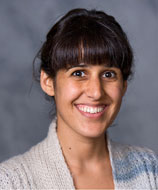You are here

Getting to Stanford will be easier, thanks to two new financial aid funds.
They Did It Their Way: Two Alums Help Students Follow Their Own Paths
Fall 2012
Born in China, Zhiyi Yu followed an Andover scholarship to the United States and never stopped, going on to Harvard before earning her MBA at Stanford's Graduate School of Business in 1999. For Eric Ly, Stanford was just a short drive from home in Sunnyvale. But after graduating in 1991, he rapidly went global, co-founding the professional networking site LinkedIn.
Even before Yu and Ly met, they had something in common: a talent for reaching across academic as well as international borders. Yu had designed her own undergraduate major in environmental science. Ly gravitated to Stanford's symbolic systems major, which blends technology with fields like philosophy and psychology.
In 2011, the couple committed $1 million to Stanford for two very personal and closely related purposes. They endowed an undergraduate scholarship to help other students reach the Farm. And they established a graduate fellowship specially designed to help students straddle multiple fields of study.
What's Your Major?
"In my time there was no department that did environment science," explains Yu. To pursue her interest in solar power, she had to assemble her own curriculum. It combined earth sciences and physics with economics and politics.
Like his future wife, Ly says, "I never really fit into any particular major. I was always in between." Fortunately, he discovered Stanford's then-fledgling program in Symbolic Systems, which blends computer science, psychology, linguistics, philosophy, and logic to explore the nature of information and intelligence in both humans and machines.
"Eric stood out," remembers John Etchemendy, the Suppes Family Professor in Humanities and Sciences, a philosopher who co-founded the program and now serves as Stanford's provost. "I would always grade his problem sets first, so I could calibrate the top end of the grading curve."
Those lessons paid off. "A lot of the ideas were very relevant to the startups I worked at, which required an understanding of not just the technologies but also what makes people really want to use them," says Ly, who most recently founded Presdo, which provides social networks for events.
Having gratefully supported Stanford over the years, when Yu and Ly found themselves able to make a more significant commitment, he says, "we wanted to support students who had similar broad interests."
Yu, a finance and private equity consultant, also recalled how her high school scholarship had changed her life. "It basically opened a whole new world for me," she says. They decided to focus on financial aid.
So Many Questions
 The first recipient of their graduate fellowship, Agustina Paglayan, knows what it's like both to leave her home country and to venture outside traditional academic boundaries.
The first recipient of their graduate fellowship, Agustina Paglayan, knows what it's like both to leave her home country and to venture outside traditional academic boundaries.
Born in Buenos Aires, Paglayan earned a degree in economics in Argentina and in public policy at Georgetown. Before pursuing a PhD at Stanford's School of Education, she worked on a range of issues, from macroeconomic to microfinance to education policy. A stint at the World Bank exposed her to the education systems of many countries.
With a growing passion to improve education, she began to wonder what it takes, from a political perspective, to achieve reform. What political incentives led Finland, South Korea, or Singapore to make teaching a high-status profession? How do teachers' unions impact the policies that are adopted and, ultimately, the quality of education?
What she needed to answer these questions was access to departments all across campus—including economics and political science. The key turned out to be a Stanford Interdisciplinary Graduate Fellowship endowed by Yu and Ly. SIGFs equip distinguished students with portable funding, freeing them from the traditional attachment to a single school or department so they can pursue the classes and mentors needed to solve problems.
"The day I found out that I got this fellowship," says Paglayan, "I started crying out of joy. It's made a huge difference for me."
Now Yu and Ly are looking forward to seeing their first undergraduate scholarship awarded. Having come so far, they seem to have gone back to their beginnings: empowering other students to pursue journeys that could lead anywhere.